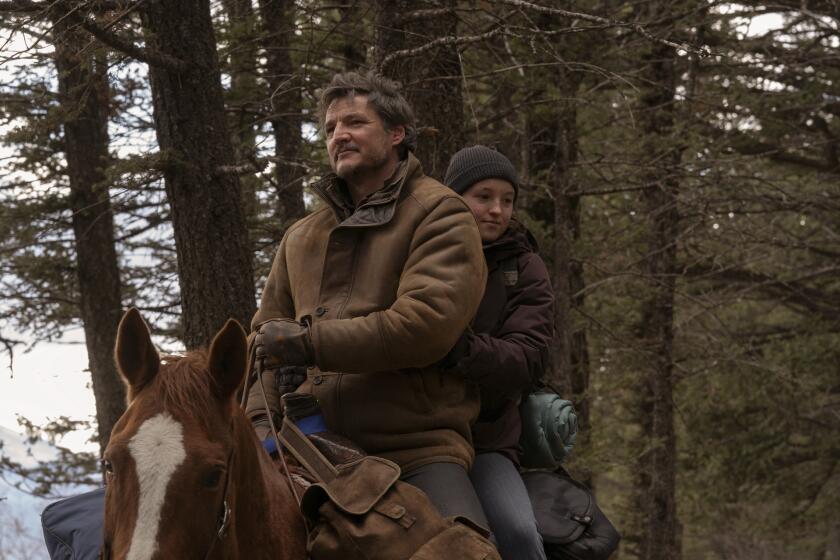With Jabs at NBC, It Seems Like Old Times for Letterman
- Share via
David Letterman turned NBC’s decision to deny him footage from his old show into a running joke Monday, at one point calling his program “part of NBC’s ‘Can’t See TV’ “--a reference to the network’s ubiquitous “Must See TV” marketing campaign.
Letterman, who shifted his late-night program to CBS in 1993, was denied video highlights from “Late Night With David Letterman,” which ran more than 11 years on NBC. The network controls rights to that show, which was made under the auspices of its production arm.
CBS requested clips for use throughout February as well as Monday’s episode, which comically marked Letterman’s 15 years in late night (his previous show premiered in February 1982) and coincided with the February ratings sweeps.
NBC declined, citing competitive concerns regarding Letterman’s show and “The Tonight Show With Jay Leno.” The network didn’t want to be perceived as helping a rival network’s ratings stunt during sweeps--a key period for network affiliates in determining local advertising rates.
Having frequently made NBC executives the butt of jokes on his earlier show by calling them “weasels,” Letterman lampooned the network repeatedly Monday regarding its response to this latest request.
“We asked the folks at NBC if we could use videotape from the old show, and frankly, they were not very nice about it at all,” he said during Monday’s monologue. “They were belligerent, they were bellicose, they were snotty, they were downright rude. It was like I was still working there.”
During his opening remarks, the host delivered his “Can’t See TV” quip and said NBC “really came through for us” by sending over a tape featuring highlights from the network’s sitcom “The Single Guy.” NBC star Jerry Seinfeld joined in the gag, appearing in a video segment in which he talked about watching the clips Letterman couldn’t use.
Later, during a comical biography, Letterman mentioned events that occurred during his NBC show, but instead of showing video, the camera simply cut to a black screen that said, “Footage Owned by NBC.”
“It felt very appropriate last night, based on the news [reports about NBC denying CBS the video], to make fun of it,” said “Late Show” executive producer Rob Burnett.
Burnett said he didn’t think the missing footage would become an ongoing comedy bit, and that no decision has been made as to whether the biography will be included in Letterman’s upcoming prime-time special, which is scheduled to air Feb. 24.
Last week, NBC called CBS’ request a stunt designed to provide fodder to publicize Letterman’s anniversary. The request, they noted, was overly broad, covering the entire month of February as well as rights to use the footage in promoting the show.
“Late Show” ratings did improve Monday, according to preliminary results from major cities metered by Nielsen Media Research. Viewing was up 11% compared to the show’s Monday average, attracting 15% of the available audience. “The Tonight Show”--kicking off a week of shows from Las Vegas seeking to boost its February performance--drew 16% of the audience.
The minor brouhaha surrounding the video represents the first flare-up in some time pertaining to late night. The once-closely followed race has been relatively sedate, with Leno maintaining a solid ratings advantage for well over a year.
The “Tonight Show” succession battle provided the basis for a book and then an HBO movie, “The Late Shift,” which top NBC executives felt portrayed them in an unflattering light. As a result, NBC officials have especially savored Leno’s resurgence and the network’s late-night turnaround.
Leno will celebrate his anniversary as host of “The Tonight Show” with a prime-time special in May, marking five years since he succeeded Johnny Carson.
Letterman eventually opted to leave NBC, taking his program to CBS, where “Late Show” initially dominated late-night viewing. Leno caught and passed Letterman, thanks in part to NBC’s prime-time dominance, which funnels viewers into late night. Both franchises remain extremely profitable.
More to Read
The biggest entertainment stories
Get our big stories about Hollywood, film, television, music, arts, culture and more right in your inbox as soon as they publish.
You may occasionally receive promotional content from the Los Angeles Times.










